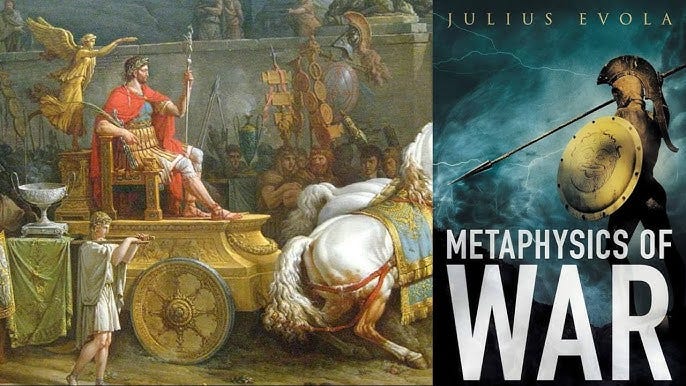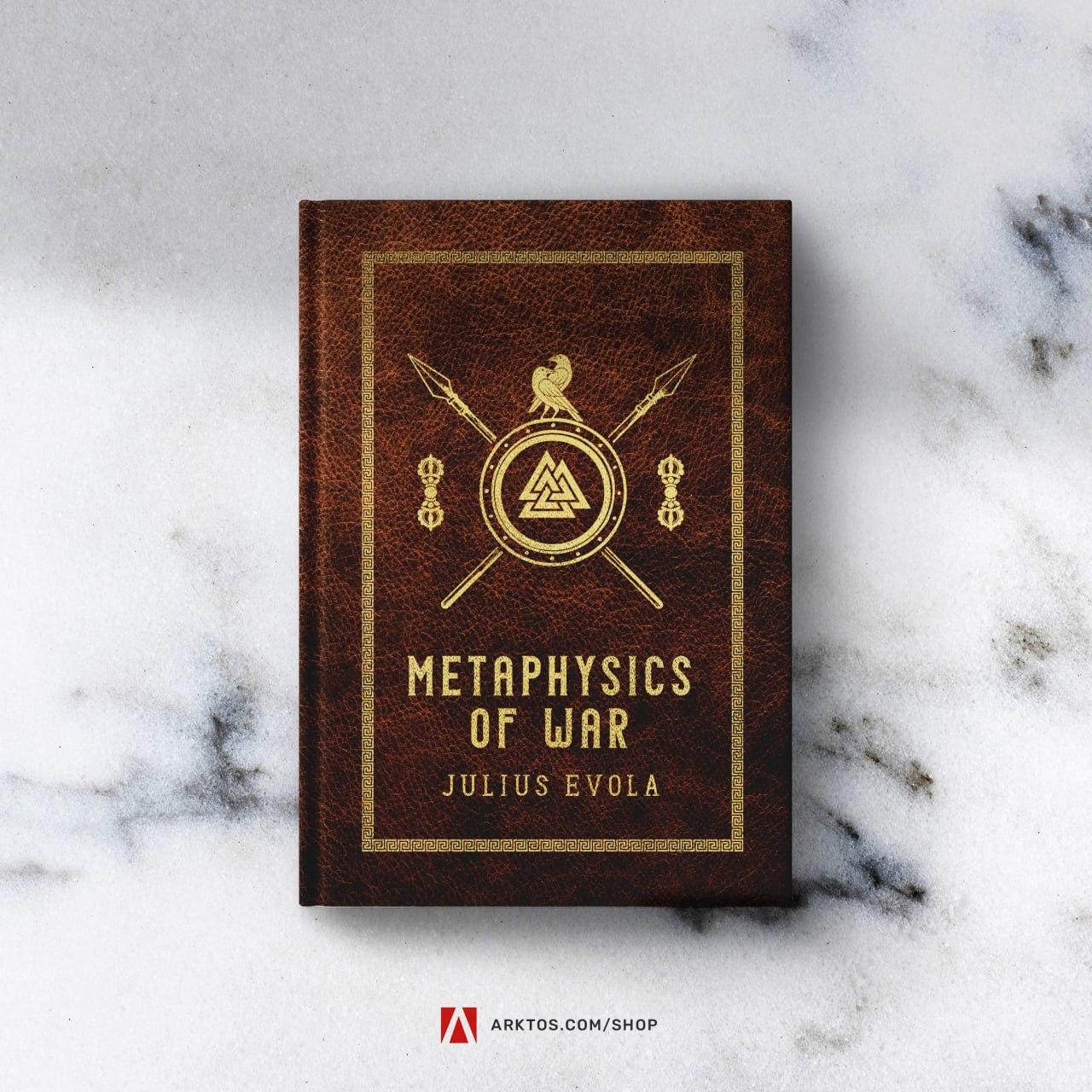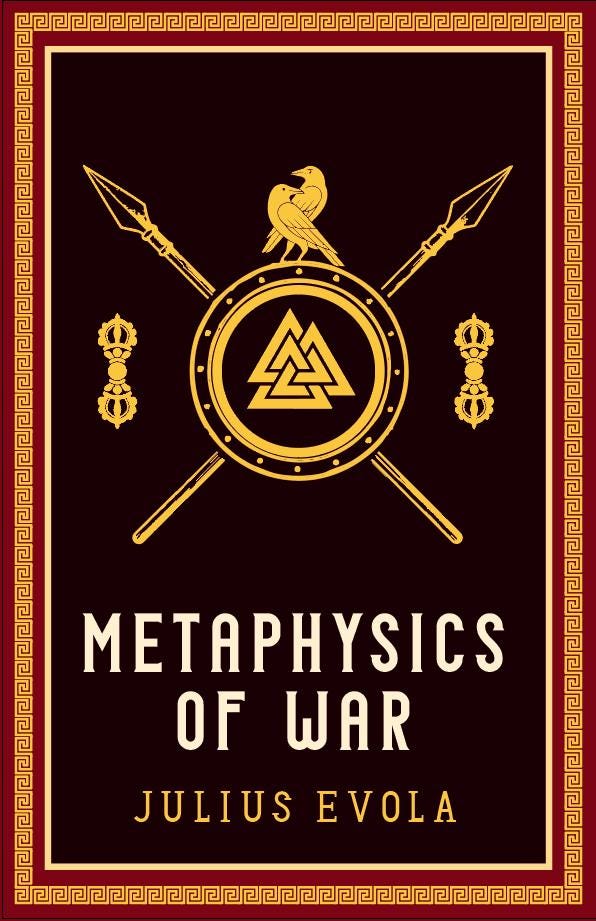The Roman Conception of Victory
by Julius Evola
In Metaphysics of War — coming soon in a new limited edition from Arktos — Julius Evola recalls the Roman vision of victory as tightly bound up with ritual, divine force, and the sacrality of sacrifice.
Sallust described the original Romans as the most religious of mortals: religiossimi mortales (Cat., 13),1 and Cicero said that ancient Roman civilisation exceeded every other people or nation in its sense of the sacred: omnes gentes nationisque superavimus (Hat: respon., IX, 19). Analogous testimonies are found in numerous variants in many other ancient writers. As against the prejudice of a certain historiography which persists in assessing ancient Rome from a solely legal and political point of view, what should be brought out is the fundamentally spiritual and sacred content of ancient Romanity, which should really be considered the most important element, because it is easy to show that the political, legal and ethical forms of Rome, in the last analysis, had as their common basis and origin precisely a special religious vision, a special type of relationship between man and the supra-sensory world.
But this relationship is of a quite different type from that characteristic of the beliefs which came to predominate subsequently. The Roman, like ancient and traditional men in general, believed in a meeting and mutual interpenetration of divine and human forces. This led him to develop a special sense of history and time, to which we have drawn attention in another of our articles here, speaking about a book by Franz Altheim.2 The ancient Roman felt that the manifestation of the divine was to be found in time, in history, in everything which is carried out through human action, rather than in the space of pure contemplation, detached from the world, or in the motionless, silent symbols of a hyperkosmia or ‘super-world’. He thus lived his history, from his very origins onwards, more or less in terms of ‘sacred’, or at the very least ‘prophetic’ history. In his Life of Romulus (1:8) Plutarch3 says in so many words, ‘Rome could not have acquired so much power if in one way or another it had not had a divine origin, such as to show to the eyes of men something great and inexplicable.’
Hence the typically Roman conception of an invisible and ‘mystical’ counterpart to everything visible and tangible which transpires in the human world. This is why rites accompanied every explanation of Roman life, whether individual, collective or political. Hence, also, the particular conception that the Roman had of fate: fate for him was not a blind power as it was for late ancient Greece, but the divine order of the world as development, to be interpreted and understood as means to an adequate science, so that the directions in which human action would be effective could be foretold, those along which this action could attract and actualise forces from above with a view not only to success, but also to a sort of transfiguration and higher justification.
Since this set of ideas applied to the whole of reality it reaffirmed itself also for ancient Rome in the field of warlike enterprises, of battle, heroism and victory. This fact allows us to see the error of those who consider the ancient Romans essentially as a race of semi-barbarians, who prevailed only through brutal force of arms, borrowing from other peoples, such as the Etruscans, Greeks and Syrians, the elements which served them in lieu of true culture. Rather, it is true that ancient Romanity had a particular mystical conception of war and victory, whose importance has oddly escaped the specialists in the study of Romanity, who have limited themselves to pointing out the many and well-documented traditions in question in a distracted and inconsequential manner.
It was the essentially Roman opinion that, to be won materially, a war needed to be won – or, at least, favoured – mystically. After the Battle of Trasimene, Fabius says to the soldiers, ‘Your fault is to have neglected the sacrifices and to have failed to heed the warnings of the oracles, rather than to have lacked courage or ability’ (Livy, History of Rome, 17:9, cf. 31:5; 36:2; 42:2).
No Roman war began without sacrifices and a special college of priests – the Feciales – was in charge of the rituals related to war, which was considered a ‘just war’, iustum bellum, only after these had been performed. As once pointed out by de Coulanges,4 the root of the military art of the Romans consisted originally in not being forced to fight when the gods were against it; that is, when by means of ‘fatal’ signs the agreement of forces from above with human forces was perceived to be absent.
Thus, the focus of the enterprise of war fell on a more than merely human plane – and both the sacrifice and the heroism of the combatant were considered to be more than merely human. The Roman conception of victory is particularly important.
In this conception every victory had a mystical side in the most objective sense of the term: in the victor, the chief, the imperator, applauded on the battlefield, was sensed the momentary manifestation of a divine force, which transfigured and trans-humanised him. The military victory ritual itself, in which the imperator (in the original sense, not of ‘emperor’, but of victorious chief) was lifted on a special shield, is not devoid of symbolism, as can be inferred from Ennius:5 the shield, previously sanctified in the Capitoline temple of Jupiter, signifies here the altisonum coeli clupeum, the celestial sphere, beyond which victory raises the man who has won.
Revealing and unambiguous confirmations of this ancient Roman conception are provided by the nature of the liturgy and the pomp of the triumph. We speak of ‘liturgy’ since this ceremony with which every winner was honoured had in Rome a character much more religious than military. The victorious leader appeared here as a sort of manifestation or visible incarnation of the Olympian god, all the signs and the attributes of whom he wore. The quadriga of white horses corresponded to that of the solar god of the bright sky, and the mantle of the triumphant, the purple toga embroidered with gold stars, reproduced the celestial and stellar mantle of Jupiter. And so did the gold crown and the sceptre which surmounted the Capitoline sanctuary. And the winner dyed his face with minimum as in the cult of the temple of the Olympian God, to which he then went to place solemnly before the statue of Jupiter the triumphal laurels of his victory, intending by this that Jupiter was its true author, and that he himself had gained it, essentially, as a divine force, a force of Jupiter: hence the ritual identification in the ceremony.
The fact that the aforementioned cloak of the triumphant corresponded to that of the ancient Roman kings could give rise to further considerations: it could remind us of the fact brought out by Altheim that even before the ceremony of the triumph of the king was defined he had appeared in the primitive Roman conception as an image of the celestial divinity: the divine order, over which the latter presided, was reflected and manifested in the human one, centred in the king. In this respect – in this conception, which, along with several others from the time of the origins, was to resurface in the Imperial period – Rome testifies to a universal symbolism, which is found again in a whole cycle of great civilisations in the Indo-Aryan world and Aryo-Iranian world, in ancient Greece, in ancient Egypt and in the Far East.
But, not to wander from the argument, let us point out another characteristic element in the Roman conception of victory. It is precisely because it was seen as a more than merely human event that the victory of a chief often assumed for the Romans the features of a numen, an independent divinity, whose mysterious life was made the centre of a special system of rituals designed to feed it, enliven it and confirm its invisible presence among men. The most well-known example is provided by the Victoria Caesaris. Each victory was believed to actualise a new centre of forces, separate from the particular individuality of the mortal man who had realised it; or, if we prefer, by victory the victor had become a force existing in an almost transcendent order: a force not of the victory achieved in a given moment of history, but, as the Roman expression stated exactly, of a ‘perpetual’ or ‘perennial’ victory. The cult of such entities, established by law, was designed to stabilise, so to speak, the presence of this force, so that it added invisibly to those of the race, leading it towards outcomes of ‘fortune’, making of each new victory a means for revelation and reinforcement of the energy of the original victory. Thus, in Rome, since the celebration of the dead Caesar and that of his victory were one and the same, and the games, which had ritual meaning, were consecrated to the Victoria Caesaris, he could be considered as a ‘perpetual victor’.
The cult of victory, which was believed to have prehistoric origins, can be said more generally to be the secret spirit of the greatness of Rome and of Rome’s faith in its prophetic destiny. From the time of Augustus the statue of the goddess Victory had been placed on the altar of the Roman Senate, and it was customary that every senator, before taking office, went to this altar and burned a grain of incense. The force of victory seemed thus to preside invisibly over the deliberations of the curia;6 hands reached out towards its image when, with the coming of a new Princeps,7 fidelity was sworn to him and again on the Third of January of each year when solemn prayers were said in the Senate for the health of the Emperor and the prosperity of the Empire. It is particularly worthy of interest that this was the most tenacious Roman cult of so-called ‘paganism’, surviving after the destruction of all the others.
Other considerations could be derived from the Roman notion of mors triumphalis, ‘triumphal death’, which shows various aspects with which we will perhaps deal on another occasion. Here we just want to add something about one special aspect of the heroic dedication connected to the ancient Roman concept of devotio. It expresses what in modern terms could be called a ‘tragic heroism’, but linked to a sense of supra-sensory forces and a higher and very specific purpose.
In ancient Rome devotio did not mean ‘devotion’ in the modern sense of the meticulous and over-scrupulous practice of a religious cult. It was, rather, a warlike ritual action in which the sacrifice of oneself was vowed and one’s own life was dedicated consciously to ‘lower’ powers, whose unleashing was to contribute to bringing victory, on one the hand, by endowing one with irresistible strength and, on the other hand, by causing panic to the enemy. It was a rite established formally by the Roman State as a supernatural addition to arms in desperate cases, when it was believed that the enemy could hardly be defeated by normal forces.
From Livy (8:9) we know all the details of this tragic ritual and also the solemn formula of evocation and self-dedication which the one who intended to sacrifice himself for victory had to pronounce, repeating it from the pontifex, clothed in the praetesta, his head veiled, his hand at his chin and his foot on a javelin. After that he plunged to his death in the fray, a hurled, ‘fatal’ force, no longer human. There were noble Roman families in which this tragic ritual was almost a tradition: for example, three of the stock of the Deci performed it in 340 B.C. in the war against the rebellious Latins, then again in 295 in the war against the Samnites, and once more in 79 at the Battle of Ascoli: as if this was ‘a family law’, as Livy puts it.
As pure inner attitude this sacrifice may recall, by its perfect lucidity and its voluntary character, what still happens today in Japan’s war: we have heard of special torpedo boats, or of Japanese aeroplanes, hurled with their crew against the target and, once again, the sacrifice, almost always performed by members of the ancient warrior aristocracy, the samurai, has a ritual and mystical aspect. The difference is certainly that they do not aim at a more than merely material action, a true evocation, to the same extent as in the ancient Roman theory of the devotio.
And naturally, the modern and, above all, Western atmosphere for thousands of reasons which have become, so to speak, constitutive of our being over the centuries makes it extremely difficult to feel and to move forces behind the scenes and to give every gesture, every sacrifice, every victory, transfiguring meanings, such as those discussed above. It is however certain that, even today, in this unleashed vicissitude one should not feel alone on the battlefields – one should sense, in spite of everything, relationships with a more than merely human order, and paths which cannot be assessed solely by the values of this visible reality can be the source of a force and an indomitability whose effects on any plane, in our view, should not be underestimated.
In our age of real and fake conflicts, the time is ripe for rediscovering the metaphysical mysteries of war and the warrior ethos. Metaphysics of War, the singular masterpiece on the spiritual dimensions of warfare by the Italian Traditionalist Julius Evola, was, is and will remain the go-to handbook for cultivating the warrior within our souls. Drawing on the arsenal of wisdom and experiences from Nordic, Vedic, Roman, Persian, Islamic and other traditions, Evola shows how the art of war can lead to transcendence and greatness in everyday life.
Now’s the time to equip yourself! Arktos is unleashing a leather-bound collector’s edition, freshly reedited, deployed in a brand new design, and armed with an original foreword by Kevin DeAnna. Limited to only 100 copies, pre-orders are now open.
1See note 4 in ‘The Sacrality of War’.
2Franz Altheim, A History of Roman Religion (London: Methuen & Co., 1938).
3Mestrius Plutarchus (46-127) was a Greek historian. All of his biographies are collected in Plutarch’s Lives.
4Numa Denis Fustel de Coulanges (1830-1889), a French historian. His principal work was The Ancient City: A Study on the Religion, Laws, and Institutions of Greece and Rome, Garden City: Doubleday, 1956.
5Quintus Ennius (c. 239 BC-c. 169 BC) was a poet and historian of the Roman Republic. Only fragments of his works survive.
6The Roman Senate.
7Another term for the Roman Emperor.






Sono un'italiana completamente ammorbata e accecata dal pregiudizio , inculcato in tutte le scuole di ogni ordine e grado (atenei compresi) di "valutare l'antica Roma da un punto di vista esclusivamente giuridico e politico". Scopro invece, da questo magistrale commento alla Metafisica della guerra di Evola, che elemento portante dell' antica Roma e' proprio il suo senso del sacro.